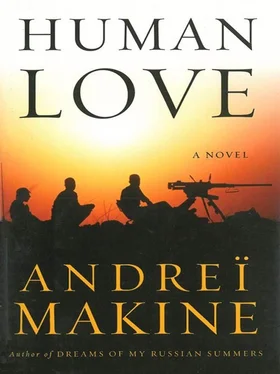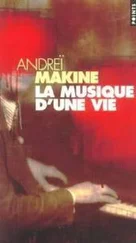HE NO LONGER REMEMBERED PRECISELY when the spell created by Ernesto’s speeches was broken. Perhaps this was the evening: from his seat beneath a tree Elias saw a young soldier drawing a spiders web of signs on the earth with a fragment of wood, smiling at his own thoughts. Lost In his daydream, he was deaf to the orators ringing words. The struggle against imperialism, the promise of happiness after the triumph of the revolution… The soldier already seemed happy here, in this night cloudy with heat, in front of the arabesques he was tracing, expressive of a secret joy, of hopes at once fanciful and humble. Then Elias noticed that the young man was not the only one to be inattentive.
Yet his father, Jacqueline, and Ernesto were unsparing of themselves as they traveled back and forth across the eastern Congo, their assigned territory. “The thunder of the people’s revolt can already be heard!” the Cuban declaimed one day at one of the rebel bases. A heavy clatter of cooking pots suddenly erupted from the kitchen, as if echoing his words. Tickled by this droll coincidence, the warriors burst out laughing. It took Ernesto some time to regain control of his audience, to reimpose the radiant trance to which his flock generally succumbed.
As the days went by the effect of this verbal intoxication grew weaker. One evening, following the speech, a soldier remained in his place after his comrades had dispersed. His eyes half closed, lulled by the drug, he was gabbling snatches of the phrases that he had just heard: “Marx,” “class struggle,” “neo-colonialism,” “Lenin”… For him these words had the same impact as the magic formulae intoned by a holy man.
Their forays now reminded Elias of trying to light a fire with damp matches. The flame flickered for the space of a slogan, only to be dissipated by the narcotic fumes in which the warriors immersed themselves every evening after a days march or a fire fight. A conflagration would have been needed, the uprising of a whole population, a “revolutionary situation.” But the revolution was slow in coming, and one morning the people appeared in the person of a tall old man who came to the camp and sat down beside the door of the “command post.” Ernesto emerged, followed by Eliass father, and the old man addressed them. They did not understand his dialect. A soldier came up and, in some embarrassment, translated.
“Hes complaining because our men have taken his food supplies.”
“Tell him our fighters are paying with their blood for the bread the people give them,” declared Ernesto in ringing tones, adding, more softly, for my fathers ears: “There you are, you see. The peasantry is a weak link in the revolution. Always this filthy petty proprietors reflex.”
“He says his son has been killed,” continued the interpreter. “And now he has his three grandchildren to feed.”
“Our soldiers may die tomorrow defending him against his oppressors! And all he can think about is his wretched potatoes…”
“He says the children may die today”
There were, Elias noted, two peoples: one of them, glorified in speeches, the “working masses,” whose triumphal entry into the paradise of communism was being prepared for, an ideal people, as it were, and then this other people, which thanks to its humdrum destitution brought dishonor to the great revolutionary project.
The warriors, too, were far from ideal. Ernesto used to mark the most exalted moments in his harangues with an abrupt gesture: he would tilt his head back, his eyes fixed on the horizon, as if he could already see the luminous advent of the future. It was just this brief pause that a soldier took advantage of one evening, to ask, in a slightly disdainful voice: “What about our pay, Commandante. When are we going to get it?” Elias looked round. A young, powerfully built man wearing a new khaki uniform, very different from those the others had managed to procure for themselves. He was surrounded by a group who looked as if they were his henchmen. Elias had a simple and disconcerting thought: That fellow in khaki could easily go over to the enemy if he were offered more.
Before going to bed he saw Ernesto writing in his notebook by the light of an oil lamp.
The following morning, on the way to another rebel camp, the Cuban gave vent to his fury: “For that politically immature soldier to be worrying about his pay is, at least, comprehensible. But when a chief like Soumialot wants to be paid for every skirmish, its enough to disgust you with this country. And in dollars, too, if you please. And after IVe promised him Cuban regiments will be coming soon… And our other strategist, this Gbenye. Have you heard his reasoning? He wants to know what tribe the enemy soldiers belong to. That s how hell decide whether or not to fight. Try talking to them about proletarian internationalism!”
Jacqueline shared Ernesto’s anger. Elias s father was silent. Then, unable to contain himself, he began to defend these former peasants, now turned revolutionaries. He explained that the country had recently emerged from long decades of oppression, with no elites, with no real identity, and that the local chiefs held fast to the only certain bond: tribal membership.
One day the debate got out of control. ‘Tm beginning to wonder,” Ernesto exclaimed furiously, “whether this historical backwardness the Congolese suffer from can ever be made up. Yes, comrade. I ask myself if they can really be made to progress to the Marxist-Leninist view of the world. Dont be angry, but I have grave doubts over the possibility of ever getting anything into these peoples skulls other than drugs, fucking, and the sorcerers’ mumbo-jumbo!” Elias thought his father was about to reply with equal sharpness. But the man held his peace, and it was only after a moment that he riposted in a calm, weary voice: “Very sorry Ernesto. This is the only people we have to offer you.”
That evening Elias witnessed a scene that appeared to prove the Cuban right. In an absurd replay, he came upon a couple negotiating a sexual deal. Beneath a lamp that lit the entrance to the camp, a soldier was holding out a garment to a young woman, all the while whispering a hurried gabble of promises. She was pretending to refuse him, but in her curiosity was already examining the fabric, turning it toward the light. “What are these stains?” she exclaimed suddenly. “Blood?” Uneasy, the soldier assumed a casual tone of voice: “Oh, that’s nothing. It’s juice. Or paint. It’ll come out in the wash…” As Elias continued on his way, he thought about the person who had been robbed of that dress; he pictured a woman violated, wounded, staining the fabric with her blood. A woman who had probably been killed for the sake of this booty… The Cuban’s words struck him as amply justified.
***
He had high hopes of the first battle he was due to take part in. Ernesto had announced an assault on a base held by Belgian mercenaries. Ellas pictured himself bringing up ammunition to the fighters, assisting soldiers riddled with bullet wounds, strolling around after the battle with a red-stained bandage about his brow… But, crucially, he would come face-to-face with the white imperialists taken prisoner by the rebels.
When it was all over, there was not a single “Belgian mercenary” among the vanquished. A vast number of wounded and dead, all black. “Africans killed by other Africans!” Elias said to himself in a hard voice, which did not belong to him and which frightened him. To silence it, he hastened to assist the nurses, carried water, walked through the conquered village looking for survivors. The injuries did not resemble the noble wounds he had pictured being delicately dressed by women’s hands. This was flesh, hideously torn to pieces by fragments from grenades, intestines spilling out from torn bellies, skulls smashed open to expose their bloody contents. Moving on from the carnage, Elias found himself in a yard and saw someone he at first took to be a wounded man shuddering with spasms of pain. The light was fading, and it took him a moment to understand: at the edge of a pond a soldier was having his way with a woman, who lay with her face against the earth. He was thrashing about on top of her and, to stop her from crying out, pressing her head into the slime of the pool. In the center of one of the nearby huts Elias discovered a little girl who had managed to squeeze her body underneath a tiny table like a contortionist. She was shaking so much, the furniture looked alive. A boy older than her had hidden himself behind a pile of branches. This screen could be seen through, but the youth, crazed with fear, must have thought he was rendered invisible by the narrow basket he had put over his head. Through the wickerwork Elias could see motionless, staring eyes.
Читать дальше









